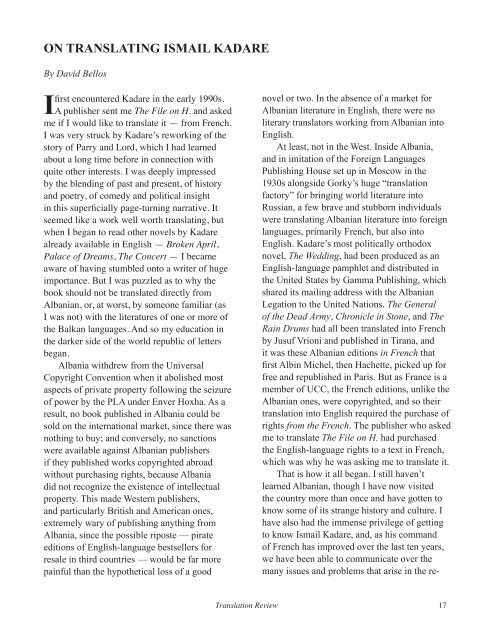Table of contents - The University of Texas at Dallas
Table of contents - The University of Texas at Dallas
Table of contents - The University of Texas at Dallas
You also want an ePaper? Increase the reach of your titles
YUMPU automatically turns print PDFs into web optimized ePapers that Google loves.
ON TRANSLATING ISMAIL KADARE<br />
By David Bellos<br />
first encountered Kadare in the early 1990s.<br />
I A publisher sent me <strong>The</strong> File on H. and asked<br />
me if I would like to transl<strong>at</strong>e it — from French.<br />
I was very struck by Kadare’s reworking <strong>of</strong> the<br />
story <strong>of</strong> Parry and Lord, which I had learned<br />
about a long time before in connection with<br />
quite other interests. I was deeply impressed<br />
by the blending <strong>of</strong> past and present, <strong>of</strong> history<br />
and poetry, <strong>of</strong> comedy and political insight<br />
in this superficially page-turning narr<strong>at</strong>ive. It<br />
seemed like a work well worth transl<strong>at</strong>ing, but<br />
when I began to read other novels by Kadare<br />
already available in English — Broken April,<br />
Palace <strong>of</strong> Dreams, <strong>The</strong> Concert — I became<br />
aware <strong>of</strong> having stumbled onto a writer <strong>of</strong> huge<br />
importance. But I was puzzled as to why the<br />
book should not be transl<strong>at</strong>ed directly from<br />
Albanian, or, <strong>at</strong> worst, by someone familiar (as<br />
I was not) with the liter<strong>at</strong>ures <strong>of</strong> one or more <strong>of</strong><br />
the Balkan languages. And so my educ<strong>at</strong>ion in<br />
the darker side <strong>of</strong> the world republic <strong>of</strong> letters<br />
began.<br />
Albania withdrew from the Universal<br />
Copyright Convention when it abolished most<br />
aspects <strong>of</strong> priv<strong>at</strong>e property following the seizure<br />
<strong>of</strong> power by the PLA under Enver Hoxha. As a<br />
result, no book published in Albania could be<br />
sold on the intern<strong>at</strong>ional market, since there was<br />
nothing to buy; and conversely, no sanctions<br />
were available against Albanian publishers<br />
if they published works copyrighted abroad<br />
without purchasing rights, because Albania<br />
did not recognize the existence <strong>of</strong> intellectual<br />
property. This made Western publishers,<br />
and particularly British and American ones,<br />
extremely wary <strong>of</strong> publishing anything from<br />
Albania, since the possible riposte — pir<strong>at</strong>e<br />
editions <strong>of</strong> English-language bestsellers for<br />
resale in third countries — would be far more<br />
painful than the hypothetical loss <strong>of</strong> a good<br />
novel or two. In the absence <strong>of</strong> a market for<br />
Albanian liter<strong>at</strong>ure in English, there were no<br />
literary transl<strong>at</strong>ors working from Albanian into<br />
English.<br />
At least, not in the West. Inside Albania,<br />
and in imit<strong>at</strong>ion <strong>of</strong> the Foreign Languages<br />
Publishing House set up in Moscow in the<br />
1930s alongside Gorky’s huge “transl<strong>at</strong>ion<br />
factory” for bringing world liter<strong>at</strong>ure into<br />
Russian, a few brave and stubborn individuals<br />
were transl<strong>at</strong>ing Albanian liter<strong>at</strong>ure into foreign<br />
languages, primarily French, but also into<br />
English. Kadare’s most politically orthodox<br />
novel, <strong>The</strong> Wedding, had been produced as an<br />
English-language pamphlet and distributed in<br />
the United St<strong>at</strong>es by Gamma Publishing, which<br />
shared its mailing address with the Albanian<br />
Leg<strong>at</strong>ion to the United N<strong>at</strong>ions. <strong>The</strong> General<br />
<strong>of</strong> the Dead Army, Chronicle in Stone, and <strong>The</strong><br />
Rain Drums had all been transl<strong>at</strong>ed into French<br />
by Jusuf Vrioni and published in Tirana, and<br />
it was these Albanian editions in French th<strong>at</strong><br />
first Albin Michel, then Hachette, picked up for<br />
free and republished in Paris. But as France is a<br />
member <strong>of</strong> UCC, the French editions, unlike the<br />
Albanian ones, were copyrighted, and so their<br />
transl<strong>at</strong>ion into English required the purchase <strong>of</strong><br />
rights from the French. <strong>The</strong> publisher who asked<br />
me to transl<strong>at</strong>e <strong>The</strong> File on H. had purchased<br />
the English-language rights to a text in French,<br />
which was why he was asking me to transl<strong>at</strong>e it.<br />
Th<strong>at</strong> is how it all began. I still haven’t<br />
learned Albanian, though I have now visited<br />
the country more than once and have gotten to<br />
know some <strong>of</strong> its strange history and culture. I<br />
have also had the immense privilege <strong>of</strong> getting<br />
to know Ismail Kadare, and, as his command<br />
<strong>of</strong> French has improved over the last ten years,<br />
we have been able to communic<strong>at</strong>e over the<br />
many issues and problems th<strong>at</strong> arise in the re-<br />
Transl<strong>at</strong>ion Review 17

















